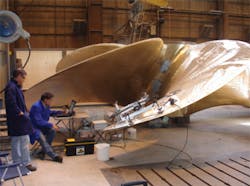Ultrasound propels nondestructive testing
Until recently, ship propellers were inspected manually using ultrasound test probes to detect defects. However, in certain circumstances, the method cannot detect cracks inside the propeller.
To identify defects automatically, researchers at the Fraunhofer Institute for Industrial Mathematics (ITWM; Kaiserslautern, Germany) have now developed a mobile mechanized ultrasound system that can be used for the nondestructive testing of complex components. The scientists received support from the Germanischer Lloyd Group (Hamburg, Germany) and propeller manufacturer Wärtsilä (Helsinki, Finland).
“With our mobile ultrasound test system, we can inspect copper-nickel-aluminum bronze propellers up to 450 mm thick and detect fissures down to a few millimeters in length. Because we emit the ultrasound at defined angles, we also find defects positioned at an angle to the surface,” says Dr. Martin Spies of ITWM.
The mobile scanner can be positioned anywhere on the propeller, and, thanks to its suction feet, it can be attached in a horizontal as well as vertical test position. The system itself uses a Synthetic Aperture Focusing Technique (SAFT) to produce 3-D image data that provides a detailed display of inclusions and welding-seam defects.
The researchers have used the mobile scanner for their on-site testing at foundries, at propeller manufacturers, on deck and in dry dock. Recently, they put the system at the world‘s largest shipbuilder in Korea. “The customer wanted to document the quality of its propellers to gain an edge over the competition,” says Spies.
-- by Dave Wilson, Senior Editor, Vision Systems Design
